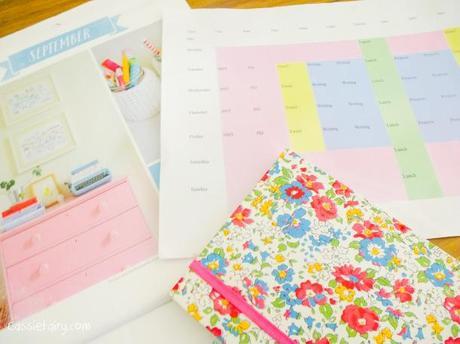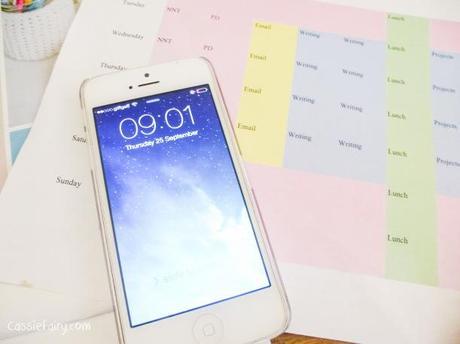Have you noticed that the days are already feeling shorter just by the evenings being slightly darker than usual? I’ve actually felt more rushed than usual in my work, and I feel like it’s taking up all of my day and I just don’t have the time to relax in the evenings. I know this is a psychological thing for me and I need to keep an eye on the time in order to realise that the day ISN’T running away with me. The light-until-10pm evenings we’ve been enjoying all summer have meant that I’ve been able to do more after work: I could still go places, hang out with friends, eat dinner al fresco and potter around the garden. I had ‘more’ time to do more activities because it was lighter until later and now I feel like it’s bed time pretty much as soon as I’ve finished dinner. Darker evenings means that I don’t want to go out for walks and once the sun has gone down the chill-factor is keeping me out of the garden. I want to make the most of my spare time but I don’t seem to be valuing my evenings as much as I did over the summer. I know it’s the same amount of hours but it’s what I can do with them that counts!

It’s time to start keeping track of my day with a timetable (yes, the first one I’ve ever made since my revision timetable at school!) and I think that I need to invest in a watch to help me stay on top of it. So far, I’ve already been putting my lunch break back by an hour each day, just because I like to finish one task before moving onto the next but I have decided to start wearing a watch for the first time in 10 years to help me keep on schedule while I’m working. It’s easy to ignore time passing when you have to pick up your phone to check what time it is, and I’ve realised that I don’t have any clocks up in my workspace, so it seems to me that a watch is an essential business investment to make sure that I work when I need to and that I actually stop when I need to!
Ever since the first pocket watches were built in the 15th Century, they have been seen as treasured items that often hold a lot of sentimental value for the wearer. As we reach the point where ‘smart watches’ are beginning to slip into the market – the recent release of the Apple Watch has shown that these gadgets come with a hefty price tag too, starting at around £215 – there is still an immense appeal for the traditional timepiece. It still ok to want a watch to just A) tell the time and B) look good! Surely that’s good enough for my needs, isn’t it?! This may also be the perfect time to find a watch that doesn’t require software updates, as non-smart watches might begin to come down in price. Technology tends to look outdated so quickly – think of those first LED watches in the 80s! – while a classic watch style is timeless (excuse the pun!).

Here are some things to bear in mind:
- Tradition is key
Traditional brands of watches such as Tissot, Raymond Weil, and Rotary never go out of style and stores such as Watches of Switzerland have all the classics. When I looked on the website I was like a kid in a candy store! These brands have lingered for a reason and, if you are looking for a watch to mark a special occasion, a graduation or a wedding, going for one of these ‘Heirloom’ brands will always be a smart move.
- Activity
This is one of the most key elements of choosing a watch. There is no point whatsoever in buying a Rolex if you are someone who is always active; climbing mountains, riding bikes, sailing etc. Imagine the terror when your prized possession cracks (literally) under the pressure of such a lifestyle. While my lifestyle is pretty-much the opposite (!) if you frequently enjoy activities like these, you can find a watch that suits them, and also looks good when you’re in a business situation.
- Classic materials
A watch made from platinum, titanium or rose gold, end across all the right messages as these materials are more expensive, classic and stylish. But you don’t have to spend more just for the sheer hell of it and I love leather and canvas straps just as much. Investing in these sorts of materials doesn’t come without their benefits; they are ultimately so much stronger too, lasting longer in more challenging conditions.
- Style and fashion
Sometimes a watch will tick (argh, I just can’t help the puns!) all the right boxes but in the end, it simply doesn’t suit your wrist, existing jewellery essentials or taste. It may be too flash for your appearance (this is an instant reaction) but you need to think about the comfort too. Trying on a number of styles before you buy is so important and will give you the best idea of what to invest if you’re on the fence about a number of styles.
- Ignore ‘jewels’ inside the watch
These are often promoted by the people selling expensive watches but I’ve found out that really the ‘jewels’ are of little importance. They are worth only a few pennies and add no real value to the watch. The exact number required for a watch depends on the design of the watch but the average mechanical watch needs about 17. They are just used as low friction pivots for parts of the mechanism rather than having any value.
I’d love to be given a watch for my upcoming birthday but I think I’d rather have the freedom to choose my own style and materials so that I can be sure that it will work with my existing wardrobe. I’m really not very flashy and I think that a smaller style would be better for me – after all, I’m only using it to keep track of my schedule so that I can finish tasks on time and so that I know when to stop work make the most of my evenings!
Here are some of my tips for creating a timetable that works:
- Include some ‘me time’ in your schedule so that you don’t start working from the minute you get up. You need this time to ease into the day and get yourself ready for the work ahead.
- Be sure to include breaks – especially lunch – because you can work on an empty stomach and you need to take your eyes off you work for a while so that you don’t end up tired and strained – see my article on tea breaks if you need more reasons why you should take a break!
- I’ve added in a hour of personal development each day. You would be given this time in an office-based job, so why not allow yourself time to develop your skills or knowledge while you’re working from home too? I watch industry videos on YouTube and like to visit MarieForleo.com for business and life tips.
- Over-estimate the amount of time it will take you to complete a task, because work always over-runs and takes longer that you think, so by adding a ‘buffer’ of half an hour will mean that you’re not always chasing time to ‘catch up’ but will sometimes finish a task ahead of time. If you do, you’re free to do some social fiddling on twitter – you have my permission!
- Don’t keep your email open all day and respond to messages as soon as they arrive. Instead, give yourself an hour in the morning and an hour in the afternoon dedicated to emails only. This way you’ll stay on task while working during the day, without interruptions.
- Allocate time for finishing off projects at the end of the day, to plan your next day’s work, or even just for reading so that you stay in touch with what’s going on in the world or in your industry – you’ll find yourself being even more motivated for the next day of work.
Do you have anything to add to my list? What do you include in your work-from-home timetable? Please leave me a comment below


